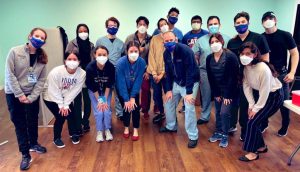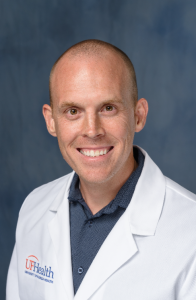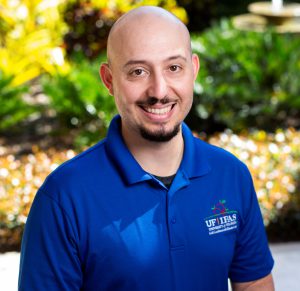HARDEE COUNTY, Fla – Farmworkers are essential to feeding America. Florida’s agricultural workforce is one of the largest in the country and includes more than 200,000 migrant farmworkers providing essential work across many crop varieties and industries year-round.
When their health is compromised, so is the nation’s food supply.
On March 26, a statewide initiative takes its critical next steps to provide farmworkers in Wauchula free access to much-needed health care at the Hardee County Agri-Civic Center, located at 507 Civic Center Drive. From 1 p.m. to 6 p.m., a health fair will provide farmworkers with free health screenings and resources for continuity of care with local partners.

Staffed by doctors, medical students and volunteer healthcare workers from UF College of Medicine, the health fair is the brainchild of the Coalition of Florida Extension Educators for Latino Communities (CAFÉ Latino), UF/IFAS Extension and Dr. Norman Beatty, an assistant professor of medicine from UF’s Division of Infectious Diseases and Global Medicine.
Eventually, health fair organizers hope to attract funding for a mobile health clinic designed to reach farmworkers throughout the state. For now, the initial health fairs are focused on building community connections and awareness that will serve as a foundation for that next step.
“Hardee County is 43% Hispanic or Latino, and most of these residents are employed in agriculture,” said Jonael Bosques, director of UF/IFAS Extension Hardee County. “Regretfully, the awareness for self-care and available health services is often overlooked by this essential portion of our local workforce.”

The citrus and vegetable production industry highly depend on migrant and permanent residents. Nationwide and locally, most of that workforce identifies as Hispanic or Latino, explained Bosques. “Additionally, in Hardee County, citrus and cattle are the two main agricultural industries followed by greenhouse nursery production and field crops such as squash and watermelons.”
At the health fair, farmworkers can get screened for chronic conditions such as diabetes, high blood pressure, obesity, major depression, heart disease and Chagas disease.
These diseases often go unrecognized for years, if not decades, before they manifest clinical signs and symptoms, Beatty explained. For example, Chagas disease is a parasitic infection found throughout Mexico, Central and South America that can often go undiagnosed. It can cause heart failure and sometimes be fatal. Early screening and connection to local health care resources can help those at-risk receive the care they need and prevent future complications.
“We have thousands of farmworkers living throughout many of the agricultural regions of this great state,” said Beatty. “They are an essential workforce in our community and our team is dedicated to breaking barriers to health care screening and other resources for healthy living.”

The genesis of the health fair came from a UF article highlighting the work being conducted by CAFÉ Latino. Beatty had already been working with Hispanic and Latino farmworkers in North Florida but needed a bridge to connect with those communities in Central and South Florida.
CAFÉ Latino became that bridge.
“We partnered with Dr. Beatty and the College of Medicine to serve this essential workforce and address the longstanding health disparities and inequities that compromise the quality of life for themselves and their families,” said John Diaz, president of CAFÉ Latino and an assistant professor of agricultural education and communication at UF/IFAS.
The first health fair took place recently in Wimauma, attracting more than 100 farmworkers. As a result, several attendees were diagnosed with diabetes for the first time along with other conditions. More than 70 COVID-19 vaccines were administered, along with more than 30 influenza vaccines and 13 hepatitis A vaccines.
Diaz and Beatty credit community partners for the success of the health fairs and joint efforts.
Partners for the upcoming event in Wauchula include Central Florida Health Care, East Coast Migrant Head Start Project, Heartland Rural Health Network, Redland Christian Migrant Association, Mosaic and Hardee Help Center.
“We are so grateful for all the support we have received from our community partners in Hardee County and surrounding regions,” said Beatty.
Partners also bring the farmworker health care needs in other counties to the surface, said Diaz. Next stop is Homestead in Miami-Dade County, followed by Osceola County. Organizers have received additional requests for a dozen other counties including Polk, Hendry, Clay and Lee.
“We are looking for more community partners to help us advance the health of this essential workforce because they are a trusted, local resources for these farmworkers and help to mitigate hesitancy related to receiving care and getting vaccinated,” said Diaz. “While much of the population was at home quarantining for COVID, farmworkers were compromising their own health to make sure we had food on our tables. Now we are putting out a call to action to be there for this group who needs our help.”
-30-
Lourdes Mederos, rodriguezl@ufl.edu
The mission of the University of Florida Institute of Food and Agricultural Sciences (UF/IFAS) is to develop knowledge relevant to agricultural, human and natural resources and to make that knowledge available to sustain and enhance the quality of human life. With more than a dozen research facilities, 67 county Extension offices, and award-winning students and faculty in the UF College of Agricultural and Life Sciences, UF/IFAS brings science-based solutions to the state’s agricultural and natural resources industries, and all Florida residents.
ifas.ufl.edu | @UF_IFAS
 0
0
